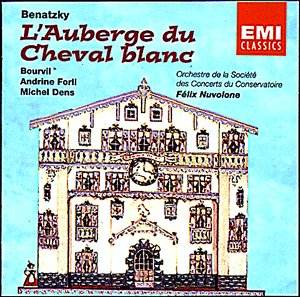 Composer: Ralph Benatzky
Composer: Ralph Benatzky
Works: L’Auberge du Cheval blanc (The White Horse Inn)
Performers: Bourvil (Leopold), Andrine Forli (Josépha), Michel Dens (Florès), Jacques Herrieux (Emperor), René Ducios Choir, Orchestre de la Société des Concerts du Conservatoire/Félix Nuvolone
Recording: Paris, 1962 EMI 7243 57407021 [CD1 48.46 CD2 47.33]
Label: LEO
Ralph Benatzky’s operetta, L’Auberge du Cheval blanc, or The White Horse Inn, occupies a curious yet significant niche in the pantheon of early 20th-century musical theatre. Premiering in 1930, it garnered notable acclaim in Berlin with over four hundred performances, attesting to its immediate popularity. Its dual adaptions for French and British stages, alongside the introduction of additional numbers by other composers such as Robert Stolz, have contributed to its enduring legacy. Benatzky, originally from Moravia, synthesized elements of Viennese operetta and cabaret, yielding a work that, while light in texture, possesses a certain charm that has resonated with audiences across generations.
The recording at hand, featuring a cast led by the renowned French actor-singer Bourvil as Leopold and Andrine Forli as Josépha, showcases a blend of vocal strengths and interpretative choices that merit scrutiny. Forli’s lyricism is particularly well-suited to her role, exhibiting a lightness and clarity that captures the whimsical essence of her character. In contrast, Bourvil’s contributions, while undoubtedly charismatic and theatrical, reveal limitations in vocal quality that detract from the overall musical experience. His resonant timbre is reminiscent of Maurice Chevalier but lacks the finesse and musicality that would elevate the performance. This disparity underscores the importance of vocal technique and interpretative nuance in operetta, where the balance of stage presence and musicality can significantly alter the audience’s reception.
The orchestral arrangements, attributed to Benatzky and Stolz, exhibit a certain thinness of texture, particularly when compared to more robust orchestrations in the operetta repertoire. The decision to replace the overture with an extended prelude disrupts the natural flow that characterizes the British edition, where the musical momentum builds to a satisfying crescendo. This French version, with its early emphasis on strident yodelling, fails to capture the ethereal quality found in the British scores, which feature delicate woodwind passages leading into the maids’ duet—a hallmark of the work’s romanticism. Notably, the choral sections, particularly the weather medley, stand out for their exuberance, yet moments of muddled diction detract from their effectiveness, possibly due to subpar miking.
Sound quality in this reissue, while acceptable, pales in comparison to later recordings within the same catalogue, raising questions about the fidelity of the original LP transfer. The absence of detailed liner notes further complicates the listener’s journey through the work, leaving them without critical contextual insights that could enhance appreciation. The indexing of tracks also presents challenges; moments of musical transition are often clipped, thereby robbing the performance of its intended dramatic pacing.
The synthesis of these elements—interpretative choices, orchestration, and sound quality—provides a rounded perspective on Benatzky’s operetta. While L’Auberge du Cheval blanc offers delightful moments of musicality and charm, the recording ultimately suffers from inconsistencies in vocal performance and orchestral arrangement that inhibit its potential impact. The work remains a testament to Benatzky’s contributions to operetta, yet this particular interpretation may only resonate with those seeking an exploratory encounter with a lesser-known gem rather than a definitive representation of the genre.